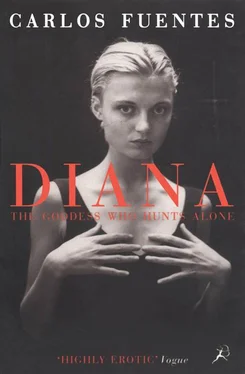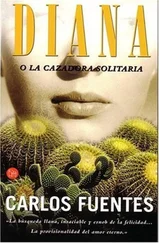Carlos Fuentes - Diana the Goddess Who Hunts Alone
Здесь есть возможность читать онлайн «Carlos Fuentes - Diana the Goddess Who Hunts Alone» весь текст электронной книги совершенно бесплатно (целиком полную версию без сокращений). В некоторых случаях можно слушать аудио, скачать через торрент в формате fb2 и присутствует краткое содержание. Год выпуска: 2012, Издательство: Bloomsbury UK, Жанр: Современная проза, на английском языке. Описание произведения, (предисловие) а так же отзывы посетителей доступны на портале библиотеки ЛибКат.
- Название:Diana the Goddess Who Hunts Alone
- Автор:
- Издательство:Bloomsbury UK
- Жанр:
- Год:2012
- ISBN:нет данных
- Рейтинг книги:3 / 5. Голосов: 1
-
Избранное:Добавить в избранное
- Отзывы:
-
Ваша оценка:
- 60
- 1
- 2
- 3
- 4
- 5
Diana the Goddess Who Hunts Alone: краткое содержание, описание и аннотация
Предлагаем к чтению аннотацию, описание, краткое содержание или предисловие (зависит от того, что написал сам автор книги «Diana the Goddess Who Hunts Alone»). Если вы не нашли необходимую информацию о книге — напишите в комментариях, мы постараемся отыскать её.
Diana the Goddess Who Hunts Alone — читать онлайн бесплатно полную книгу (весь текст) целиком
Ниже представлен текст книги, разбитый по страницам. Система сохранения места последней прочитанной страницы, позволяет с удобством читать онлайн бесплатно книгу «Diana the Goddess Who Hunts Alone», без необходимости каждый раз заново искать на чём Вы остановились. Поставьте закладку, и сможете в любой момент перейти на страницу, на которой закончили чтение.
Интервал:
Закладка:
Only movies give us the real image of the person: she was this way, and even if she’s acting Queen Christina she’s Greta Garbo, even if she’s pretending to be Catherine of Russia she’s Marlene Dietrich. The Soldier Nun? But it’s only Maria Félix. Literature on the other hand liberates our graphic imagination: in Thomas Mann’s novella, Aschenbach dies in Venice with the thousand faces of our imagination all in motion; in Visconti’s film, he has only one face, fatal, unexchangeable, fixed, that of the actor Dirk Bogarde.
Diana, Diana Soren. Her name evoked that ancient ambiguity. Nocturnal goddess, lunar metamorphosis, full one day, waning the next, a silver fingernail in the sky the day after, eclipse and death within a few weeks … Diana the huntress, daughter of Zeus and twin sister of Apollo, virgin followed by a retinue of nymphs but also mother with a thousand breasts in the temple at Ephesus. Diana the runner who only gives herself to the man who runs faster than she. Diana of the crossroads, called for that reason Trivia: Diana worshipped at the crossroads of Times Square, Piccadilly, the Champs Elysées…
After all is said and done, the game of creation defeats itself. First because it takes place in time, and time is a fucking bastard. The novel takes place in 1970, when the illusions of the 1960s were doing their best not to die, assassinated but also vivified by blood. The first revolt against what our own fatal fin de siècle society would be: so brief, so illusory, so repugnant, the sixties killing their own heroes, the U.S. saturnalia devouring its offspring — Martin Luther King, the Kennedys, Jimi Hendrix, Janis Joplin, Malcolm X — and enthroning its cruel stepfathers, Nixon and Reagan.
Diana and I would play the Rip Van Winkle game: what would the old man say if he woke up after sleeping for a hundred years and found himself in the United States of 1970, with one foot on the moon and the other in the jungles of Vietnam? Poor Diana. She saved herself from waking up today and seeing a country that lost its soul in the twelve Reagan-Bush years of spurious illusions, brain-killing banalities, and sanctioned avarice. She saved herself from seeing the violence her country brought to Vietnam and Nicaragua, which boomeranged back to the sacrosanct streets of a suburbia profaned by crime. She saved herself from seeing the primary schools drowning in drugs, high schools becoming mad, gratuitous battlegrounds; she saved herself from seeing the daily random death of children murdered by pure chance when they happened to look out a window, fast-food customers machine-gunned with hamburgers still in their mouths, serial murderers, unpunished looters, ritualized corruptions because theft, fraud, murder to obtain power and glory were part — why not? — of the American Dream.
What might Diana have said, what might the solitary huntress feel, seeing the children of Nicaragua mutilated by weapons from the United States, seeing blacks kicked and their heads split by the Los Angeles police, seeing a parade of grand liars in the Iran-Contra conspiracy swearing the truth and proclaiming themselves heroes of freedom? What might she say, she who lost her child, of a country that is seriously considering sentencing child criminals to death? She would say that the 1960s ended up by going white, fading like Michael Jackson, the better to punish anyone of color. I’m writing in 1993. Before the century ends, the burning graves, the dry rivers, the swampy slums will fill up with the color of migrant Mexicans, Africans, South Americans, Algerians, of Muslims, and Jews, over and over …
Diana the goddess who hunts alone. This narrative, weighed down by the passions of time, defeats itself because it never reaches the ideal perfection of what can be imagined. Nor does it desire that perfection, since if language and reality were identical, the world would come to an end, the universe would no longer be perfectible, simply because it would be perfect. Literature is a wound from which flows the indispensable divorce between words and things. All our blood can flow out of that hole.
Alone at the end as we’re alone at the beginning, we remember the happy moments we save from the deep latency of the world, we demand the slavery of happiness, and we only listen to the voice of the masked mystery, the invisible throb that in the end manifests itself to demand the most terrible truth, the sentence that brooks no appeal, of time on earth:
You did not know how to love. You were incapable of loving.
Now I’ll tell this story to admit just how right the horrible oracle of truth was. I didn’t know how to love. I was incapable of loving.
II
I met Diana Soren at a New Year’s Eve party. Actually, it was a double celebration the architect Eduardo Terrazas staged at his house: the New Year and a reconciliation between me and my wife, Luisa Guzmán. Eduardo and I had shared a little house in Cuernavaca during 1969. I would write from Monday to Friday, then he and his girlfriend would come down from Mexico City for a weekend devoted to friends, food, and alcohol. Lots of women passed through. I had turned forty in 1968 and gone into a midlife crisis that lasted the whole year and culminated in a party I gave for my friend the American novelist William Styron in the Opera Bar on Avenida Cinco de Mayo, a tarnished but flashy leftover from Mexico’s belle époque (supposing there really was such a thing). The Opera was down at the heels — too many domino matches and near-misses at the spittoon.
I invited all my friends to honor Styron, who had recently published The Confessions of Nat Turner, a very successful and very provocative book. The parties most provoked were members of black organizations who said that Styron had no right to speak in the voice of a black man, Nat Turner, who in 1831 led an uprising of sixty fellow slaves, burning buildings and killing in the name of freedom until he himself was killed in a woods where he’d survived on his own for two months. Because of his insurrection, the slave laws were tightened. But because they were so tight they kindled even greater revolts. Styron recounted one — but only one — of the stations in the calvary of the United States, which is racism.
When Bill feels he’s being hounded in his country, he calls me and visits Mexico, and I do the same when Mexico starts getting on my nerves, knowing I can always take refuge on Martha’s Vineyard, Bill’s island on the edge of the North Atlantic. Now the two of us were living in a little house I rented when I separated from Luisa Guzmán. Located in the cobblestoned neighborhood of San Angel, a separate city until recently, where families from the capital would vacation in the last century and that now survives disguised in monastic robes amid the noise and smoke of the Periférico, the beltway around the capital, and Avenida Revolución.
My neo-bachelor residence was constructed out of debris salvaged from torn-down buildings. It was designed by another Mexican architect, Caco Parra, who specializes in combining huge hacienda doors, pilasters from nationalized churches, ancient beams from the long-disappeared age of the viceroys, sacrilegious columns, and profaned altars: a complete history of how the privileged havens of the past were transformed into the civil, transitory sanctuaries of the present. Using all these elements, Parra built strange, attractive houses, so mysterious that their inhabitants could wander into their labyrinths and never be seen again.
Martha’s Vineyard, on the other hand, is open to the four winds, incinerated by the sun for three months of the year and then battered by the frozen blasts of that great white whale the North Atlantic. Whenever I think of Styron holed up on his island, I imagine that Melville’s Captain Ahab sailed out to kill not the whale but the ocean, Neptune himself, just as the Belgian imperialists in Conrad’s Heart of Darkness fire their cannon not at a black enemy but at an entire continent: Africa. On Styron’s island, even during the hottest months, the fog rolls in every night from the sea, as if to remind the summer that it’s only a transient veil that will be torn open by the great gray cloak of a long winter. The fog comes in from the sea, over the beaches, the cliffs at Gay Head, the docks at Vineyard Haven, the lawns and the houses, until it reaches the umbilicus of the island, the melancholy inland ponds where the sea recognizes itself and dies, drowned.
Читать дальшеИнтервал:
Закладка:
Похожие книги на «Diana the Goddess Who Hunts Alone»
Представляем Вашему вниманию похожие книги на «Diana the Goddess Who Hunts Alone» списком для выбора. Мы отобрали схожую по названию и смыслу литературу в надежде предоставить читателям больше вариантов отыскать новые, интересные, ещё непрочитанные произведения.
Обсуждение, отзывы о книге «Diana the Goddess Who Hunts Alone» и просто собственные мнения читателей. Оставьте ваши комментарии, напишите, что Вы думаете о произведении, его смысле или главных героях. Укажите что конкретно понравилось, а что нет, и почему Вы так считаете.












